The digital meeting between Joe Biden and XI Jinping 2:25
Hong Kong (CNN) -
The mere fact that US President Joe Biden and his Chinese counterpart Xi Jinping are speaking now is in itself a significant development.
Relations between the United States and China, which came to a near complete breakdown during the final year of President Donald Trump's term, had descended into outright hostility during the most recent high-level bilateral meetings, including the now infamous Alaska Summit of March, during which diplomats from both sides exchanged picks.
And while Monday's virtual summit between the two leaders did not see any substantive policy on key issues such as climate, trade, pandemic or arms control, it did establish a dialogue that can be built, potentially easing tensions and allowing for a return to a more constructive and stable relationship.
This was the first virtual meeting between Joe Biden and Xi Jinping
There are already signs that this is paying off, as it was reported late Tuesday that China and the United States have agreed to relax visa restrictions for journalists from the other side.
But while the background music from both countries is undoubtedly positive, closer examination suggests that Beijing had more reason to rejoice.
advertising
Inflation overshadows signing of Biden's infrastructure plan 6:39
"Biden reiterates that he does not support Taiwan independence!" Proclaimed the first headline to appear in Chinese state media after the summit.
A related hashtag soon became the main topic of Weibo, the heavily censored version of Twitter in China, attracting more than 200 million views.
The Chinese Communist Party (CCP) sees "reunification" with Taiwan - a self-managed democracy that has never ruled - as a key unresolved issue on China's path to its "great rejuvenation."
The fact that an American president potentially agrees with China's point of view on this issue is therefore a great propaganda victory.
But, based on the reading of the White House meeting, that's not exactly what Biden said;
in fact, the American reading made no mention of independence at all.
Regarding Taiwan, President Biden stressed that the United States remains committed to the "one China" policy, guided by the Taiwan Relations Act, the three joint communiqués and the six guarantees, and that the United States strongly opposes unilateral efforts to change the status quo or undermine peace and stability across the Taiwan Strait, "the White House said.
"Healthy debate", but no progress in the critical conversations between Joe Biden and Xi Jinping
Biden offered further clarification on the matter Tuesday night.
"I have said that it is they who have to decide ... Taiwan, not us. We are not promoting independence," Biden said.
Explaining his position early Tuesday, the president said that "we made it very clear that we support the Taiwan Law, and that's it," adding that Taiwan "makes its own decisions."
In what is known as the US "one China" policy, Washington acknowledges Beijing's position that Taiwan is part of China, but has never endorsed the CCP's claim to sovereignty over Taiwan.
It maintains close unofficial ties with Taipei, and is obligated to support the island with the means to defend itself under the Taiwan Relations Act.
Xi Jinping's achievements in China could allow him to rule for life 3:21
A detailed 3,900-character reading published by the Chinese Foreign Ministry again quoted Biden as saying that the United States does not support Taiwan's independence, but did not mention Washington's firm stance against "unilateral efforts to change the status quo." .
Instead, it showed Xi launching a direct hit - and making a veiled threat - at Washington.
According to the Chinese reading, Xi blamed the rising tensions in the Taiwan Strait on what he called Taipei's attempt to "lean on the US to seek independence", as well as "the intention of some Americans to use Taiwan to contain China. "
"Such movements are extremely dangerous, like playing with fire. Whoever plays with fire will get burned," Xi told Biden, according to the Chinese reading.
"We are patient and will strive for the prospect of peaceful reunification with the utmost sincerity and effort. However, if the separatist forces of 'Taiwan independence' provoke, compel or even cross the red line, we will have to take drastic measures." Xi added.
Such forceful rhetoric is likely to resonate with China's domestic public, many of whom staunchly support unification with Taiwan.
Xi secured his power at a key Communist Party meeting last week, paving the way to secure a third term and more.
And now, at the national level, he is presented as if he, too, had emerged triumphant from the meeting with Biden.
"Of course, in China they have to claim victory. That is why they have stressed that the Biden administration has reiterated its opposition to the independence of Taiwan," said Jean-Pierre Cabestan, an expert on Chinese politics at Hong Kong Baptist University.
For Beijing, the view of the meeting is at least as important as its content.
Biden government bans Nicaraguan officials from entering the US after elections
In the Chinese capital, the virtual summit was held in a gold-painted, red-carpeted room in the Great Hall of the People.
Xi and Biden's faces appeared side by side on a huge screen that broadcast the meeting live, while Chinese leaders, including Xi himself, sat meters apart in a row across the room, a strikingly different setup than the one American officials had in the Roosevelt Room of the White House.
According to the Chinese reading, Xi compared China and the US to two giant ships at sea, each of which must be steered firmly to avoid collision.
"In a sense, it gives China a lot of status, great power status. Biden has agreed to speak with China as equals, mentioning the key issues that both countries must address together, from climate change and North Korea to Afghanistan. Cabestan said.
And for Xi, building bridges with Biden and trying to normalize bilateral relations also helps his domestic political agenda.
"President Xi, of course, is entering a very political year," said Paul Haenle, director of the Carnegie-Tsinghua Center for Global Policy, citing Xi's attempt to seek an unprecedented third term in power in the 20th. Party Congress next fall.
Is China's armament increasing?
This is what we know 2:46
"So this (will be) an important year and President Xi, I think, will focus heavily on removing those risks and uncertainties in the US-China relationship so that he can really focus on domestic politics in preparation for Congress. of the Party, "Haenle said.
It is clear that Xi is interested in minimizing risks before congress and establishing a stable relationship between the United States and China, putting up guardrails to prevent unforeseen incidents leading to conflict. "
Ryan Hass, a senior fellow at the Brookings Institution, said internal factors are likely to play a role for both leaders in the year ahead.
"Neither leader will want it to appear that they are softening their approach to the other, but at the same time, neither leader will see the benefit of allowing the relationship to escalate significantly beyond current levels of tension," said.
"So the relationship will probably navigate between a fairly firm floor and ceiling over the next year."
ChinaJoe BidenXi Jinping





/cloudfront-eu-central-1.images.arcpublishing.com/prisa/OORXB2YNDLANHK3OYLEUMD7SPM.jpg)
/cloudfront-eu-central-1.images.arcpublishing.com/prisa/FIJVMOBHZRWVDBKS3NAQ2M4JRE.jpg)


/cloudfront-eu-central-1.images.arcpublishing.com/prisa/2C5HI6YHNFHDLJSBNWHOIAS2AE.jpeg)




